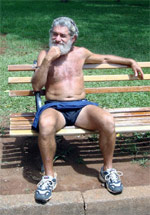“I just don’t have the energy I used to”. I hear this a lot from
colleagues and friends. I even feel like that myself from time to time.
While I think I know what they are saying, I don’t actually know what
‘energy’ is. At least, I don’t know what the term means in the context
of growing older. I can definitely distinguish the feelings I associate
with moods as a kind of ‘energy’. When I’m excited, challenged,
interested or committed, I seem to have a lot of it. When I’m bored,
tired, disinterested or apathetic, I don’t. So is mood what we mean
when we use the term? If so, then we can change our energy level by choosing to change our moods.
On
the other hand, there is energy involved in our biological processes.
We take in fuel, burn it and then have BTUs to operate our physical
bodies. This thermodynamic explanation reminds us our biological
‘machine’ works better when it is cared for, takes in good fuel and is
maintained in good condition. When we eat well, get adequate rest and
follow a balanced exercise regime, we have more energy than when we
don’t. From this perspective, we can choose to improve our energy level by changing our actions.
There
are lots of theories about energy. Some distinguish our chakras as the
portals through which we connect with life’s forces and access its
energy. Kundalini is regarded by billions as the main source of life
energy and can even be dangerous if we get too much of it at once
without awareness of what’s happening. One of the fundamental tenets of
traditional Chinese culture is the concept of qi (or chi, life energy),
and their exercise and medical traditions are based on understanding
its flow through our bodies. Indian traditions similarly name this life
force ‘prana’.
What all of these views have in common is that age is irrelevant to how much energy we have or experience.
If one is healthy and fit—no matter whether young or old—there is no
energy deficit. Compare two individuals of different ages with
different bone structures, strength levels and flexibility: their
energy levels have nothing to do with their age, and everything to do
with their moods and actions.
‘Declining energy’ is one of the
myths we have about aging—a powerful story we should begin to dispel.
If age doesn’t predetermine a loss of ‘energy’, then there is no imperative that we ‘slow down’ or become less active as we age.
It means we need to be responsible for our moods and our physical
wellbeing at all ages and take actions appropriate to our interests in
life.

